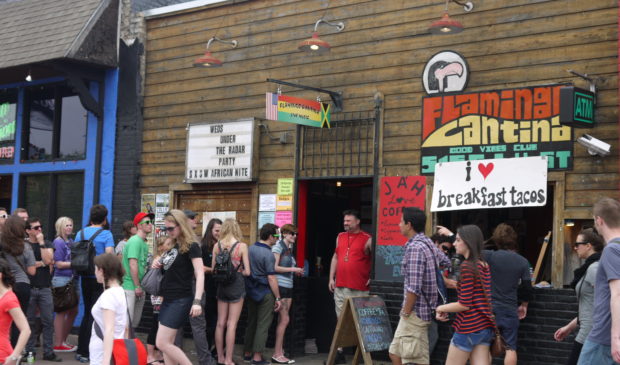Creative groups highlight CodeNEXT’s impacts on arts, music spaces
Tuesday, July 31, 2018 by
Chad Swiatecki A collection of arts and music organizations throughout Austin hope to do the next-to-impossible: bring a level of clarity and understanding to the city’s massive CodeNEXT document by focusing on the sections impacting the increasingly endangered creative community.
In a treatise released Monday, the group of 17 businesses and nonprofits break down how the proposed new citywide land use plan deserves the attention of creative stakeholders, highlighting changes such as better clarification of “live performance” use and how new developments could receive incentives for offering affordable creative spaces on ground floors in pedestrian-friendly areas.
“By specifying cultural land uses in terms of types, scale and site development standards, the City provides a mechanism for applying future funding, incentives and districting programs that will aid the economic development efforts to support and retain Austin’s vital creative sectors,” the statement reads in part. “The most recent CodeNEXT draft includes several important improvements that positively impact Austin’s arts and music environments.”
The statement was part of the work of a working group that included members of the city’s Arts and Music commissions plus representatives from some arts and music organizations. Rather than an endorsement of the document, it is intended to emphasize relevant portions for those who said they have been confused by the highly technical nature of the nearly 18 months of discussion ahead of City Council’s expected vote on its adoption this fall.
“We felt there was a lot of misunderstanding and misinformation going on within the arts and music community with regard to CodeNEXT and were hearing from peers and colleagues who were confused by it and saw it as a threat about how it was impacting their businesses,” said Brad Carlin, a member of the working group who engaged with dozens of local groups over recent months.
“We thought it would be good to dig deeper and do some clarifying because there was lots of good stuff in there for arts and music, and we were surprised to hear how many people felt otherwise. That told us there was work to be done as far as having the conversation about what’s in CodeNEXT and what we saw as positive opportunities.”
The statement comes in the aftermath of a recent ruling opening up a November ballot question that could make large-scale changes to the city’s Land Development Code subject to a public vote. That action doesn’t explicitly put CodeNEXT on the ballot in November but could lead to a future election covering its adoption.
Dave Sullivan, a local planning activist who served on the city’s CodeNEXT advisory group, said businesspeople and leaders of arts organizations started to respond once the potential benefits of CodeNEXT’s changes were spelled out clearly.
“We had a pretty diverse group who went out and told them clearly that if it passes as it is currently it’d be easier to operate as a place that sells booze, or that it makes sure these kinds of places are spaced out in pedestrian-oriented areas around the city,” he said. “We played the role of getting the facts out there because we realized we needed to show the things that help the music and arts communities.”
Sullivan, who is also a board member of the Austin Creative Alliance, said that organization and other arts nonprofits who are in some way involved with or supported by the city steered away from signing on to the statement because of CodeNEXT’s connection to the upcoming election.
Council Member Ann Kitchen, who has led recent Council efforts to preserve creative space and support local artists, said she hopes the combined statement will bring more attention to CodeNEXT and the way it can prevent Austin’s growing affordability issue from further marginalizing the creative community.
“These groups have highlighted an area we’ve talked about a lot, how affordability affects the city’s creative community,” she said. “They’ve done it in a way that makes the issues easy to understand and talk to others about. That will help us get the kind of feedback we need to make some of these changes really hit the mark.”
Curious about how we got here? Check out the Austin Monitor’s CodeNEXT Timeline.
Photo by Yusuke Kawasaki made available through a Creative Commons license.
The Austin Monitor’s work is made possible by donations from the community. Though our reporting covers donors from time to time, we are careful to keep business and editorial efforts separate while maintaining transparency. A complete list of donors is available here, and our code of ethics is explained here.
You're a community leader
And we’re honored you look to us for serious, in-depth news. You know a strong community needs local and dedicated watchdog reporting. We’re here for you and that won’t change. Now will you take the powerful next step and support our nonprofit news organization?









